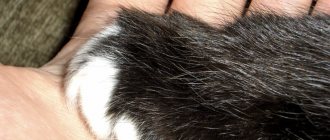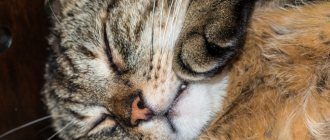9608Administration
The birth of a pet has always been a very important event. In order to avoid various complications and unforeseen situations, you need to prepare for them in advance, and for this you need to know how the cat behaves before giving birth.
It all starts not from this, but from one to three days after a successfully completed mating. It is easy to catch this moment if it was controlled and much more difficult if the cat became pregnant on its own. In any case, it is necessary to understand what is happening in order to take all necessary measures in a timely manner.
© shutterstock
A healthy cat experiences pregnancy and childbirth quite calmly and behaves very restrainedly, not particularly requiring help or other intervention. Complications can occur in small cats, as well as in purebred cats and those in poor health. Some cats may vomit before giving birth. In developed countries, childbirth is carried out under the supervision of a special doctor, but in our country, owners are forced to help their cat themselves.
Secretive cat nature
Wild cats are predominantly nocturnal predators, able to navigate well in low light and come out to hunt at dusk. In the morning, the animals return to their daytime roosts, located in hidden places, such as:
- rock cleft;
- fork of branches in dense foliage;
- tree hollow;
- earth hole;
- hole under the roots.
Pets. The activity of domestic cats is also confined to the dark time of day. The mustachioed tabbys devote daylight hours to lazy pastime, getting up only to have a snack, visit the litter box, and lick themselves.
Kittens can hide:
- in the closet among bedding and things;
- on a bookshelf;
- in a cardboard box (read more about why cats love boxes);
- in a pan, vase, empty flower pot;
- in the washing machine;
- in a laundry basket;
- under a closet, sofa or bed;
- behind the central heating radiator;
- behind the chair;
- under the blanket.
In addition to a light half-sleep with closed eyes and the “inner guard” turned on, cats have real deep sleep, which is necessary to maintain health and restore strength. However, such complete relaxation is only possible in complete safety, silence and darkness. That is why mustachioed striped creatures choose hidden dark corners for themselves.
According to research by zoologists, the animal feels comfortable when the walls of the shelter touch the body. That’s why a cat’s favorite places to sleep are never too spacious.
Anti-stress nook
Personal space is of particular importance in a stressful situation, since a wise protective instinct commands cats to sit in a secluded place until the threat has passed. A disturbed cat will dive into its house, and if there is none, into one of its favorite inaccessible corners of the apartment.
Sources of fear. A loud noise or a previously unseen object can frighten an animal. So, a real shock for a timid pet will be a major repair or installation of large household appliances. Cats also quickly get tired of overly active guests and run away to the most distant dark room. Stress can be triggered by a move, an exhibition or a visit to the veterinary clinic.
Help for kids. The need to scoot and hide in a cozy den is characteristic of cats of all ages, but the psyche of small kittens is especially sensitive, instinctively striving for something warm and soft, so similar to the fluffy side of their mother. In order for the baby to quickly adapt to the new home, it is recommended to purchase a sleeping place in one of the configurations at the pet store:
- closed soft bed;
- frame house;
- “tunnel” or “hole” with a rounded mouth;
- an envelope or sleeping bag with a flattened entrance.
It would be great if the inner surface of the “den” is lined with plush or faux fur. The walls of a warm and soft shelter muffle extraneous noise and light, allowing the kitten to sleep peacefully. To prevent your baby from feeling lonely, you can put a plush toy or bedding in the house that smells like a native nest.
Cats that require special care. In addition to kittens that have just been weaned from their mother, the following are prone to “games of hide and seek”:
- timid and nervous individuals;
- young cats in the presence of an adult and confident fellow tribesman;
- cats picked up on the street and not used to living in a house;
- animals that have been mistreated and physically harmed at the hands of humans.
Owner actions.
The owner is not recommended to forcibly disturb the peace of an animal hidden in the saving darkness - this is how the body restores psychological balance.
Unsocialized wild animals can “thaw out” only with time and gentle handling. With a long “reclusion”, you can try to lure the cat out of the “den” with the help of a toy or treat.
Hiding, provoked by the clarification of the relationship between two individuals, will resolve itself when the animals get used to each other and establish the rules of the hierarchy. To avoid provoking a fight, it is recommended to install two different trays, two houses and two food bowls in different parts of the house.
Hunting games
Wild animals. Representatives of the cat family belong to ambush predators, not adapted to long pursuit of prey, and therefore hunt from shelters. Lions lie down in front of a herd of antelopes in the grass of the savannah, a spotted jaguar is hidden by the play of light among the branches, and a domesticated murka is spread out on the asphalt, sneaking up on a pigeon.
Domestic individuals. The mustachioed striped one, which does not leave the apartment, has fun through hunting games, suddenly jumping out of its secret hiding place. Especially young, uncastrated animals and representatives of hybrid breeds obtained by infusion of real “wild blood” like to go on safaris.
Any moving object can be the object of the hunt: from a ball made of candy foil to a shaggy vacuum cleaner and the ankles of the hostess. The simulation of an attack and capture of the “victim” turns out to be quite realistic, using the entire cat’s arsenal of 30 teeth and 20 claws.
What should the owner do? To wean your pet from making unexpected attacks, it is recommended to work with it more, socializing it and teaching it to play in a “civilized” manner. An abundance of various fun activities will help to throw out the hunting ardor, and a game complex and targeted training will teach the energetic cat intricate tricks.
Some cats have a genetic tendency to hide food supplies in secluded corners because their wild ancestors did not always manage to eat regularly.
Waiting for offspring
The desire for privacy in a safe place is typical of cats preparing to become mothers. They are driven by parental instinct, since in the natural environment a woman in labor and her offspring can be easy prey for the ubiquitous hungry predators. Feeling the birth of a new life, the cat:
- turns out to be selective in food, showing either clear signs of toxicosis or increased appetite;
- becomes more cautious and less playful, trying not to make sudden movements and acrobatic jumps;
- gains weight and becomes rounder at the sides;
- pays special attention to her belly, licking it and even growling at the kids getting naughty inside;
- in the last week of pregnancy detects swelling of the mammary glands and the appearance of colostrum;
- shortly before the expected birth, she becomes restless, refusing food and meowing loudly.
Some females show independence and do not leave their favorite dark corner for a long time, while others, on the contrary, require the help of the owner and can set up a “maternity room” in the master’s bedroom, throwing things off the shelves of the wardrobe or anointing themselves directly into bed. After giving birth, a cat is usually so preoccupied with motherhood that she leaves the nest only when very hungry and due to physiological need.
Also watch the video why the cat is hiding:
In case of illness
A sick or wounded animal is not able to run away, hunt or offer serious resistance, therefore, in the natural environment, sick animals try to sit out in a shelter until the condition stabilizes.
The sensitive instincts of domestic cats force them to repeat the behavioral stereotype of their wild ancestors and hide away from prying eyes. You can suspect something is wrong if a pet hiding in a dark place:
- does not respond to calls;
- refuses not only the usual food, but also treats;
- becomes apathetic and indifferent to toys and fun;
- turns out to be unusually hot to the touch;
- constantly rubs sour eyes and nose with its paws;
- continuously licks any part of the body;
- unable to empty the bladder, or the urine has a strong odor and blood;
- experiences a frequent urge to vomit and/or defecate, and the feces are liquid with an admixture of undigested food residues, mucus and blood.
Cats experience temporary illnesses, but ignoring obvious signs of poor health is unforgivable carelessness. To dispel all doubts and take emergency measures in case of serious trouble, a depressed animal must be shown to a veterinarian without delay.
Seclusion due to illness
Sick and wounded animals instinctively hide, because they are unable to actively resist and withstand danger. Domestic cats who feel depressed do the same thing, shutting themselves off from the world and immersing themselves in their pain. They may avoid human company, but go to the hospital under a blanket, especially with chills and elevated body temperature.
Refusal of food, lethargy and reluctance to leave the shelter should alert the owner, since the stronger the disease, the weaker and more apathetic the animal becomes.
Why does a cat need to hide?
The desire to hide in a dark place for a while is quite common among domestic cats. The hunter's instinct prompts them to take a position in a secluded corner so that they can calmly observe what is happening without being noticed. In other cases, especially small kittens, they want to be in a warm, cozy “nest”, where they are comfortable and safe. Fur babies grow and sleep a lot, so they need proper rest. Constantly playing TV and other noises do not provide the opportunity to have a good rest. Truly deep sleep is only possible in darkness and complete silence.
It should not be surprising that cats find secluded corners in completely different places.:
- closet,
- box,
- under the bed or sofa,
- washing machine drum,
- on the shelf,
- behind the battery,
- under the owner's blanket.
If the cat hides constantly, then you need to buy one for it in a special store or make a house yourself. Fluffy pets love such shelters. This is connected not only with psychology, but also with physiology. Cats often sleep curled up. When sleeping in a confined space, they can lean their back against the wall of the house, thus relaxing their muscles.
Instincts and habits
Wild cats sleep in depressions but prefer open areas. The reason is the survival instinct; the tailed animal must always be able to stand up quickly, fight or run. Most likely, you have seen films about lions. The male, the leader of the pack, sleeps on a hill, which allows him to protect not only himself, but also the lionesses. The conclusion is obvious, cats do not tend to hide while sleeping.
There are also several species of small wild cats that live in burrows. This is explained by the habitat, since larger predators live around the tailed animals. Otherwise, the need to hide during sleep appears only when the animal is vulnerable. Transferring these natural laws to pets, we can conclude that if a sick or pregnant cat climbs under the blanket, this is absolutely normal.
There is no need to worry if your pet has been accustomed to sleep in comfortable places since childhood. Some pets like to burrow into their owner's things or crawl under the covers just because it's softer and more comfortable. For many pets, the need to sleep covered comes out of nowhere; the cat tries it once and understands that it feels good. Further, this habit takes root and becomes part of the normal daily routine.
Main reasons for seeking shelter
There are many explanations for why a cat hides in dark places. In some cases, the shelter is not always truly dark, but simply cool or, conversely, warm. There may be several favorite places for a pet, often they are well known to the owner. It is advisable not to disturb the animal at such a moment, because sometimes he needs to be alone with himself.
Why does a cat try to be invisible, let's name common reasons:
- character trait;
- the presence of another, older cat in the house;
- the need to calm down after suffering stress;
- anticipation of the appearance of offspring;
- desire to play;
- desire for security.
Timid by nature
By nature, some cats are sociable, while others prefer loneliness. Those who belong to the second category instinctively try to be “in the shadows” more often, which guarantees safety. Such a kitten will not sleep on a wide sofa with its tummy up, with its paws spread to the sides. Also, he will not once again catch someone’s eye. You can force him to come out of hiding with gentle words, a favorite treat, or a bright, entertaining toy.
If the cat is hiding, then you should not lure it out or put pressure on it. Perhaps something alarmed her, someone scared or offended her. She will go out on her own when she considers it necessary, wants to eat or take a walk. If you do not allow the predator to avoid an unpleasant situation, then its anxiety will only intensify.
Trying to get peace and comfort, even sociable cats hide. They may find a place for themselves in the linen closet or on the cool wooden floor under the bed. It all depends on whether the pet is cold or hot.
Away from the Boss
The presence of another cat or an older cat in the house causes the younger cat to hide more often. The owner can create a maze of boxes especially for him, through which he can easily get to a bowl of food or tray. The boxes must have multiple entrances and exits so that you can escape in time, avoiding a dangerous or unwanted collision with your opponent.
Motivation
The obvious and most common reason for a cat to crawl under the covers is to seek warmth. Pets' body temperature is higher than ours, which means it is more comfortable for them to be under a blanket or sleep on a heating radiator, especially in winter. In the summer, when owners are sweltering from the heat, the cat may also seek warmth at night and crawl under the blanket. Another reason is temperature stability. It is known that the blanket itself does not warm, but it allows you to retain body heat, that is, reduce heat transfer.
The desire for comfort is an equally important reason why cats climb under the covers. The owner's bed and the blanket itself are soft. Although most cats are not picky about where they sleep, every second cat will prefer a soft surface to a hard one. In childhood, kittens are more comfortable sleeping on soft things, since they still gravitate towards memories of their mother and brothers and sisters. Older cats may suffer from joint pain, which becomes less bothersome in warmth on a soft surface.
The desire for peace is an unconditioned reflex characteristic of all living beings. The reason for motivation is the ability to fall into a deep sleep phase. When the environment is noisy and bright, the cat may doze, but not sleep. It is in the deep sleep stage that the animal stops hearing, that is, it is in its most vulnerable state. However, only in a state of deep sleep does the immune system work at full capacity and active tissue renewal (cell division) occurs. It has been established that animals in a constant state of stress age much faster precisely because they cannot graze. By the way, when cats are cold, they also cannot fall into a deep sleep phase. Moreover, when the body is actively heated, the cat’s vitality runs out very quickly.
Many animals find it difficult to be separated from their owner every day. It is normal for you to leave for work and come to pet your pet. For a cat, this is not enough and she will crawl under the blanket only because she wants to smell your scent. It may not just be a matter of feelings of affection. Some unsterilized pets are attracted to the smell of the owner's sweat, this is especially true for cats and male owners. The smell of hygiene products (shower gel, shaving products) can emit the aroma of mint or light notes of valerian, which cats really like.
Note! If you bathe your child in sedatives (valerian, string, motherwort) before bed, the cat may want to sleep next to the baby.
There are thousands of cases where cats helped the owner cope with stress or poor health. The pets showed persistent attention, literally made the owner happy, climbed into the bed... and this helped the person feel better. It is believed that cats are sensitive to emotions and perfectly detect the owner’s stress using their sense of smell. If your pet is very intrusive, think that perhaps you are tormented by some worries, and the cat is trying to calm you down.
Hundreds of confirmed cases describe how cats saved their owners from imminent disaster. A very popular story was about how a cat did not let its owner sleep, climbed under the blanket, scratched and lured him out of the bedroom to the kitchen in every possible way... and when the four-legged seer finally led her owner out of the bedroom, a huge piece of concrete slab fell onto the bed. Without a doubt, the man would have died if he had not listened to the call of the pet. There are many stories about how cats warn their owners about epileptic seizures or heart failure. Some animals saved their owners by carrying essential medicines in their teeth...it's incredible, it's amazing, but it's a fact.
When to be wary
If a cat begins to hide in dark, cool places, then this is an alarming and not a very good sign. It is possible that in this way she is trying to get rid of high body temperature.
The increase in temperature is a consequence:
- scared, scared
- physical activity,
- hot weather,
- poisoning,
- acute pain.
This condition quickly normalizes. But if the temperature rises sharply by several degrees and does not subside for a long time, then this is a sign of the development of pathology. In this case, the animal must be urgently shown to the veterinarian.
How to understand that a cat is not feeling well. At these moments, her behavior changes sharply, she stops eating, sleeps a lot, does not want to use the litter box, meows pitifully, hides in a dark place - this signals the onset of the disease. Other symptoms may include diarrhea, vomiting, mucus from the nose and eyes, and hair loss. When an animal tries to perch on a tile or cold floor, such behavior indicates its poor condition. Most likely, the pet needs medical attention.
As cats age, they increasingly desire privacy; they are irritated by noise and bright lights, so they take refuge in dark places. Old animals may partially lose hearing, vision, sense of smell, or become ill.
Many furry pets love to climb into bags and boxes; some manage to lie down in a vase or pan. This should not cause concern to the owner. You just need to be careful not to move the chair or chair abruptly, as the animal may sit under it and get hurt. Before turning on the stove or washing machine, first look inside to see if there is a fluffy ball there. Try not to let the cat's fun with hide and seek turn into a tragedy. Complete mutual understanding will be the key to a pleasant life together.
Why do cats hide in dark places?
Cats, unlike dogs, are more reserved animals who do not particularly welcome guests into the house and prefer to hide from them in far corners. This is largely due to the fact that, by nature, mustachioed pets are introverts. However, inexperienced owners may not be aware of this and therefore become concerned if their cat hides in dark places, attributing this behavior to illness. The article will analyze in detail the reasons for this habit, and also provide recommendations on how to rid your furry pet of it.
Signs of a physical illness
Although animal psychologists are sure that in most cases, hiding in a secluded place is associated with the character of the cat, one should not discount such an unpleasant factor of such behavior as the presence of pathological processes in the body. This is especially true in cases where the habit arose suddenly, although the cat had not done anything like this before. That is why the owner must know which behavioral reactions are characteristic of his animal and which are not.
Veterinarians advise owners who are concerned that their furry friend has begun to hide in a dark corner to pay attention to such painful symptoms that appear in parallel, such as:
- The animal does not eat anything for a long time.
- Uncontrollable thirst or, conversely, the pet practically does not drink water.
- The pet began to sleep for a long time.
- Problems with the gastrointestinal tract in the form of diarrhea.
- The cat is vomiting severely.
- The appearance of the coat deteriorates, loses color, and the fur becomes lumpy or falls out.
Psychological discomfort
Cats do not have a strong nervous system, so they are extremely vulnerable to stress disorders. If the owner has wondered why the cat is hiding under the sofa or in the closet, then the answer to this may be strong nervous experiences that the animal has recently undergone. These include:
- moving to a new place of residence, home renovations or long travel;
- sometimes the reason for hiding from the owner is a trip to the veterinarian, after which the cat stops trusting his “boss”;
- the appearance of a new pet, child or simply a stranger on the cat’s “territory”;
- complete lack of communication between the cat and the immediate owner;
- often cats hide because one of the family members treats them badly;
- If a cat escaped from home, but was returned back, then it needs some time to recover from the stress it experienced. As a result, she may hide under the bed or just sit behind a chair. This is nothing unusual, just give her time to adapt.
The owner of the animal must clearly understand that prolonged exposure to stress can cause various pathological processes in the cat’s body that negatively affect its health. First of all, the stomach and heart suffer; over time, the immune system weakens, and this makes the entire body vulnerable. Therefore, you need to save your pet from nervous shock as quickly as possible.
Attachment to a person
Domestication has led to the emergence of human dependence in animals, so cats can climb into bed with their owner due to tender feelings. They purr musically, rub their cheeks and butt funnyly, trample their owner with their paws and hug like bored little children. When the owner leaves, his scent remains in the bed, which has a calming effect.
There are cases where cats climbed up to the blanket in order to wake up their owner in case of a fire, gas leak or an approaching earthquake. And perhaps the stories about the mystical abilities of mustachioed striped creatures to draw negative energy from a person and heal bodily ailments are not so fantastic.
Almost all cats love warmth; the desire to bask in them is inherent in nature itself. Owners often note that the cat hides under the blanket. This is a good option for a furry pet, the warmest and safest place. Previously, in villages, cats spent most of their time on the stove, but now the alternative is heating radiators, ovens, or a place next to the owner.
Pregnancy
Pregnant cats sometimes behave very strangely. However, it is important to know that during this period their instincts, laid down by nature itself over thousands of years of evolution, become more acute. In particular, the expectant mother begins to take care of kittens even before the moment of their birth. This is expressed in the form of the fact that she is actively looking for a secluded nest where no one will disturb her.
Caring owners should foresee this moment and arrange such a nook for the animal. The ideal option is a regular cardboard box lined with warm material at the bottom. Such a measure will save owners from searching in the future for squeaking kittens, which the fluffy beauty will hatch in the most inaccessible place.
During pregnancy, cats often become irritable and aggressive; they can meow loudly and even hiss at the owner. Therefore, it is better to save them from the annoying attention of children, as well as loud sounds, so as not to once again disturb the animal, which is already on the verge of nervous exhaustion.
Beginning cat lovers should not forget that their meowing friend is a predator who loves to ambush in the wild. If a cat sits in a secluded place, then it’s not a fact that he feels bad or is an introvert, maybe he’s just lying in wait for the “victim”. In this case, it is important to protect the animal from hiding in life-threatening places, such as an oven, washing machine or tightly closed cabinets or bedside tables, from which the tailed animal cannot get out on its own.
How can I fix this behavior?
If you have a cat and you're worried about her suffocating under the covers, here are some tips:
Lock the bedroom to prevent the cat from sneaking into the room
This is the best you can do. You don't have to worry about your cat suffocating, and he won't wrinkle or stain the blanket.
Stack pillows or make a hiding place out of boxes
You can give your kitty the same feeling as being under a blanket if she can burrow into the pillows. You can also make “hides” from cardboard boxes. Your furry will appreciate this nest.
Place a comfy blanket in your cat's bed
Your cat won't want to get into your bed if he has his own comfy spot.
Some brands offer blankets with beautiful, attractive designs. They are soft, cuddly and easy to wash and will help keep you warm on cold nights and cloudy weather.
Age
If at an early age a cat runs away to dark places because it is easier to take the owner by surprise, then with older animals the situation is not so clear. A decrepit pet loses its senses, it is no longer attracted to active games and noise, so it is not surprising that it wants to sleep away from all the fuss.
Be respectful of your old pet's needs. He needs more time to recuperate, so try not to make noise in the place where your tailed friend prefers to rest. Veterinarians note that if an elderly animal is not given plenty of rest, it will significantly shorten its life.
Correction methods
So, above it was described in detail why a cat hides in dark places at home. Now it’s worth moving on to questions about how to correct this behavior or make it less risky for the animal. In this regard, experts offer a number of effective recommendations, depending on the cause of the behavioral act:
- In case of stress disorders, it is necessary to completely eliminate the reason that makes the cat want to hide in the far corner. In addition, it is permissible to use light sedatives, presented in the form of tablets and drops, which the pet should drink at a time when stress is especially strong.
- If the cat was hiding due to any disease, and in addition the owner noticed aggravating symptoms, such as diarrhea, vomiting or severe thirst, then it is necessary to take it to a veterinary hospital.
- In cases where the need for privacy in dark places is related to the pet’s character traits, you should arrange a safe and quiet corner for him, where he will feel comfortable when strangers come into the house.
- During pregnancy, provide the expectant mother with a nest, which is quite simple to build from the most common means at hand. Then show it to the cat, let her sniff it and examine it carefully. If she didn’t like the place, then move the structure to the room where she already gave birth or where she often went in search of a safe shelter.
Finally, I would like to say that in most cases there is nothing wrong with hiding a furry friend in secluded places. The owner must treat such “oddities” of his pet with understanding and is obliged to protect him from a fatal accident, expressed in getting into the drum of a washing machine along with laundry or being locked in a closet. If the habit appeared abruptly and is accompanied by painful signs, then it is worth showing your pet to a doctor, this will protect him from the risk of dangerous pathologies.
Sources:
https://porodakoshki.ru/koshka-pryachetsya-v-temnye-mesta-prichiny/ https://koshkamurka.ru/9089-kot-pryachetsya-v-temnye-mesta.html https://veterinargid.ru/cats /uhod/pochemu-koshka-pryachetsya-v-temnye-mesta.html
The desire to help a person
There are many examples of cats crawling into a person’s bed to cure him or improve his well-being.
If an animal behaves too intrusively, crawls under the blanket, trying to wake up a person, then you should pay attention to its behavior. Perhaps the cat is feeling restless or it’s time to go for a walk. Most likely, she wants to warn her beloved owner about something. Owners tell many stories about how cats saved them from accidents, warned them of heart attacks, and even brought medicine in their teeth.
Pets perfectly sense the human condition, have a good sense of smell and hearing, so they can notice what the owner himself is not able to see. Listen to your cat and you will learn many useful things.
Does your cat crawl under the covers? Purrs, stomps around, fidgets, and then goes back to his place? Want to understand what this means? Worried that your pet is not feeling well? Let's look into the strangeness that suddenly washed over the pet.











